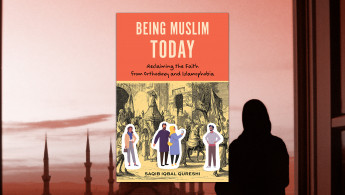Understanding Islam beyond stereotypes in Dr Saqib Qureshi's Being Muslim Today
“What I am proposing is not just an emancipation from various forces trying to co-opt and control Islam, but also an emancipation of the soul.”
This is certainly an ambitious and bold proposition and Being Muslim Today: Reclaiming the Faith from Orthodoxy and Islamophobia by Dr Saqib Iqbal Qureshi is a book that intends to pull no punches.
The scope of the book is extensive, with chapters dedicated to topics such as the historicity of the Quran, the reliability of hadiths, the formation of Shariah, the humanity of the Prophet Muhammad, the Prophet’s companions, Sufism, women’s rights, interest on loans, Islamophobia, and apostasy.
Dr Qureshi was partly inspired to write the book by a question from his 15-year-old son, who wondered if Islam is truly more violent than other religions.
While the book does not directly answer this question, it provides insights that help address it in the latter half. The book represents what Dr Qureshi wishes he had when he was a young man learning about Islam and grappling with confusing answers about the faith.
Accepting uncertainty in faith
The first half of the book aims to challenge the certainty that Dr Qureshi believes Muslims today have about their faith tradition.
His goal is not to turn readers into non-believers but to encourage humility and openness to diverse opinions and interpretations, which he feels are often lacking in Muslim circles today.
A key theme in the early chapters is that doubt is acceptable and does not imply a lack of faith. For instance, he reminds readers of the Prophet’s reaction to receiving the first revelation: “He returned to his wife, Khadija, shaken by the experience. Far from rising to the occasion, Prophet Muhammad thought he might be going mad and wanted to hide from the world.”
Dr Qureshi argues that this reaction contrasts with the idealised image of the Prophet’s life often presented by Muslims today. He believes that the Prophet’s shock and human response make him more relatable from his perspective.
The book argues that doubt is a natural part of faith and that we should be tolerant of it. Dr Qureshi supports this argument by highlighting that there are conflicting accounts of the Prophet’s life and death from sources respected by Muslims today. He further notes that some of the earliest biographies of the Prophet are missing, as crucial texts from the 8th and 9th centuries have not survived.
Questioning orthodoxy
While Dr Qureshi spends much of the book addressing issues within Shariah, Hadiths, and related topics, a major problem with his arguments is that he does not clearly define what he means by “orthodoxy.”
He refers to orthodoxy as holding certain beliefs and suggests that questioning or doubting these beliefs may lead to exclusion. Although he outlines some of the beliefs associated with this orthodoxy, he does not provide a clear definition of who or what constitutes it, when it emerged, or how widespread it is.
Readers are left to guess who Dr Qureshi is referring to, as he introduces figures who often do not align with today’s orthodoxy or whose beliefs contradict what he describes as orthodoxy.
It remains unclear whether “orthodoxy” refers to a scholarly movement, popular religious beliefs, a social media trend, or something originating in either medieval times or the 1990s. This vague and blending treatment of the issue may weaken the argument.
Inclusive discussions for marginalised groups
Being Muslim Today offers thoughtful points and valuable insights, particularly in its advocacy for pluralism and acceptance of diverse viewpoints.
Dr Qureshi, for example, addresses the mistreatment of women, arguing that the Quran does not prescribe distinct roles for women.
Instead, such ideas often arise from interactions with non-Muslim societies and customs, particularly those influenced by Aristotle. This argument is both intriguing and significant.
The book holds considerable potential, especially for feminist, LGBT, and other marginalised readers who may find its discussions on relevant issues enlightening. However, the lack of clarity regarding the definition of “orthodoxy” remains a significant issue.
Despite this limitation, Being Muslim Today is bold, ambitious, thought-provoking, and engaging.
Usman Butt is a multimedia television researcher, filmmaker and writer based in London who read International Relations and Arabic Language at the University of Westminster and completed a Master of Arts in Palestine Studies at the University of Exeter




 Follow the Middle East's top stories in English at The New Arab on Google News
Follow the Middle East's top stories in English at The New Arab on Google News


